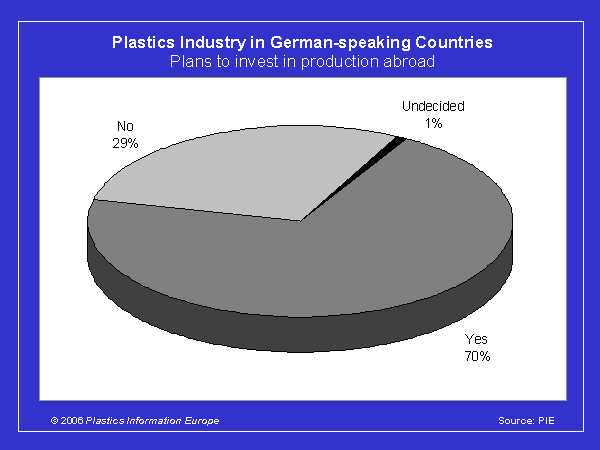CORPORATE STRATEGY
Plastics companies in German-speaking countries are truly international / Both producers and converters plan investment abroad / More than just an extended work bench
More than 80% of plastics industry companies in the German-speaking countries already have established production abroad or are in the process of doing so. As a rule, the biggest and the most export-oriented players are the most likely to set up shop outside national borders, PIE´s sister publication Kunststoff-Information (Bad Homburg / Germany; www.kiweb.de) found in a survey of readers.
Some 44% of the companies with substantial foreign business reported being already active internationally, including 54% of converters, the biggest industry grouping. Another 27% are mulling or actively planning an international presence. The responses, says KI, appear to demonstrate to de-bunk the myth that many companies that move abroad, regret it and later pull out. Only 1% of those surveyed admitted to doing this.
The motivation for investing in other countries include lowering costs and expanding into new markets – each reason was named by a third of respondents. Some 22% said they were following customers, whereby only converters tended to see the extended workbench concept as the sole reason for relocation. All survey respondents pointed to cost savings as a major factor, whereby larger companies expressed equal interest in expansion.
Not unsurprisingly, China is currently the preferred destination for plastics companies investing internationally. Some 20% of the KI subscribers named China, 19% eastern and southern Europe, 18% the new EU member states and 13% the "old" 15-member EU. Asia excluding China was named by 9%, North America by 7%, Turkey by 5% and Latin America by 3%.
Interestingly, 42% said they were investing abroad to safeguard business at home, and 19% were expanding both at home and abroad. Around 18% planned to lower their profile at home, although only 2% intended to close plants. This, says KI, "seems to show that for the plastics industry globalisation is not only a threat, but also offers chances for business."
Some 44% of the companies with substantial foreign business reported being already active internationally, including 54% of converters, the biggest industry grouping. Another 27% are mulling or actively planning an international presence. The responses, says KI, appear to demonstrate to de-bunk the myth that many companies that move abroad, regret it and later pull out. Only 1% of those surveyed admitted to doing this.
The motivation for investing in other countries include lowering costs and expanding into new markets – each reason was named by a third of respondents. Some 22% said they were following customers, whereby only converters tended to see the extended workbench concept as the sole reason for relocation. All survey respondents pointed to cost savings as a major factor, whereby larger companies expressed equal interest in expansion.
Not unsurprisingly, China is currently the preferred destination for plastics companies investing internationally. Some 20% of the KI subscribers named China, 19% eastern and southern Europe, 18% the new EU member states and 13% the "old" 15-member EU. Asia excluding China was named by 9%, North America by 7%, Turkey by 5% and Latin America by 3%.
Interestingly, 42% said they were investing abroad to safeguard business at home, and 19% were expanding both at home and abroad. Around 18% planned to lower their profile at home, although only 2% intended to close plants. This, says KI, "seems to show that for the plastics industry globalisation is not only a threat, but also offers chances for business."
 | |
22.05.2006 Plasteurope.com [205338]
Published on 22.05.2006

 German version of this article...
German version of this article...